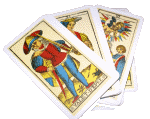
Bohemian Gothic Tarot
XI JUSTICE
Lighter or more conventional meanings
Being fair and objective about a decision * Getting what you deserve, for better or worse * Karma and higher justice * Seeing justice done - this could mean punishment or reward.
Darker, shadow or more hidden meanings
A pretence at justice, though the outcome is already decided * Corruption * Vengeance disguised as justice * Pride - deciding that you, and you alone, can judge a situation. * Being punished unfairly.
The idea of "justice" often evokes strong emotions and these can vary from a totally negative extreme desire for revenge, to a feeling that you need to get the positive outcome that you deserve. We're sometimes slightly afraid of the concept but in fact, it's essentially neutral. Justice just means what is fair, and this can be good or bad, depending on whether we feel punishment or reward is justified.
The main figure in the Bohemian Gothic Justice is a gaunt, dishevelled looking judge carrying a copy of the dreaded Malleus Maleficarum ("The Hammer of the Witches") a treatise on how to identify, try and convict witches that was first published in 1487. It was written by Heinrich Kramer and Jacob Sprenger who were both members of the Inquisition. Effectively, the book became the handbook for the European witch hunts which continued right up to 1700.
The witch trials were neither justified nor just. Most people now regard them as a manifestation of hysterical superstition, and their methods seem to a modern eye to be designed simply to convict as many people as possible - often using torture if necessary to extract confessions. The setting of this picture, in a stony passage that suggests a dungeon, and with the red glow of fire seen on a distant doorway, reminds us of this horrifying use of fire both in torture and as the preferred way of putting witches to death.
Much classic Gothic literature shows the established church, and Catholicism, in particular, in a negative light. From early works such as Poe's The Pit and the Pendulum, which is about a horrific torture chamber devised by the Inquisition, right up to the present day vampire horror, Salem's Lot, by Stephen King, the church is often portrayed as weak at best and threatening and sinister at worst. So although the judge in this card might in his own mind have been battling to cast out demons and expose witchcraft, we are more likely to see him as someone who is horribly misguided or prejudiced.
Like many of the cards in this deck, there is an ambiguity in the image that asks us, the readers, to decide what is being portrayed. The swathed figure in the background could be a monk who has been assisting the interrogation. Alternatively it could be a phantom of one of the old women put to death. If we interpret it as the latter then we have to wonder if the judge is haunted, literally or metaphorically, by his actions.
When you pull this card in a reading, it's time to ask about what justice, reward and punishment could mean in different circumstances, and whether the "justice" meted out by an established institution - with complex structures of rules and regulations - necessarily results in fairness or compassion to the individual. Surely cruelty, in the name of justice, should never be justified.
Some further ways to consider this card
The judge also carries a lighted candle, which reminds us of the "bell, book and candle" used in Roman Catholic ceremonies of excommunication (removing someone from inclusion in the church and religious community). If we take a different approach to this picture and decide that it shows a brave judge who has been honestly trying to cast out evil, then what range of new meanings might that bring in a reading?
Because of his patricide and many foulest mischiefs wrought by witchcraft, the two Supreme Justiciars of Nancy passed a very heavy sentence upon Desire Finance... namely that he should be punished by being torn with red-hot pincers and then be cast alive on to the fire.
- Francesco Maria Guazzo, Malleus Maleficarum.
Bell, book, and candle; candle, book and bell, Forward and backward, to curse Faustus to hell.
- Christopher Marlowe, Doctor Faustus (Scene 7)









